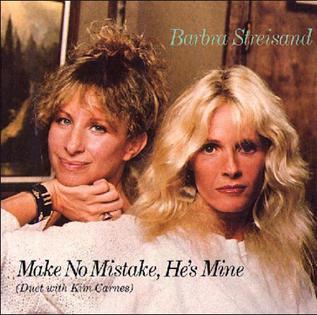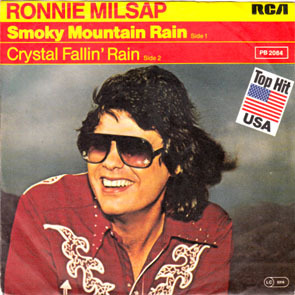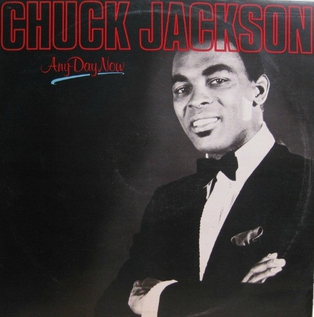
Ronnie Lee Milsap is an American country music singer and pianist.

"Since I Don't Have You" is a song written and composed by Jackie Taylor, James Beaumont, Janet Vogel, Joseph Rock, Joe Verscharen, Lennie Martin, and Wally Lester. It was first a 1958 hit single for the doo-wop group the Skyliners on the Billboard Hot 100. Country music singer Ronnie Milsap had a hit with the song in 1991. American hard rock band Guns N' Roses also had some success in 1994 with their version of the song which reached the top 10 on the UK Singles Chart.

"In the Still of the Nite", also subsequently titled "In the Still of the Night", is a song written by Fred Parris and recorded by his band the Five Satins. Originally the song was titled "(I'll Remember) In the Still of the Nite" to distinguish itself from Cole Porter's "In the Still of the Night.” Later the title was changed to "In the Still of the Night".

"Make No Mistake, He's Mine" is a song written by Kim Carnes, recorded as a duet with Barbra Streisand in 1984. The duet was subsequently recorded as "Make No Mistake, She's Mine" by Ronnie Milsap and Kenny Rogers in 1987. Both versions of the song charted.

"Smoky Mountain Rain" is a song written by Kye Fleming and Dennis Morgan, and recorded by American country music singer Ronnie Milsap. It was released in September 1980 as the first and only single from his Greatest Hits compilation album. The single became one of his best-known songs.

"It Was Almost Like a Song" is a song written by Hal David and Archie Jordan, and recorded by American country music singer Ronnie Milsap. It was released in May 1977 as the first single and title track from the album It Was Almost Like a Song. It became one of the greatest hits of his recording career upon its release in 1977.

"(There's) No Gettin' Over Me" is a song written by Walt Aldridge and Tom Brasfield, and recorded by American country music singer Ronnie Milsap. It was released in June 1981 as the first single from the album There's No Gettin' Over Me. Known by many fans by its less grammatically correct title "There Ain't No Gettin' Over Me" — the song's official title appears nowhere in the lyrics — the song became one of Milsap's biggest country hits and his only top 10 pop hit during his recording career.

"I Wouldn't Have Missed It for the World" is a song written by Charles Quillen, Kye Fleming and Dennis Morgan, and recorded by American country music singer Ronnie Milsap. It was released in October 1981 as the second single from the album There's No Gettin' Over Me. The song became one of his biggest hits in his recording career and came during the peak of his crossover success.
The discography of American country music singer Ronnie Milsap consists of 30 albums and 79 singles. Since releasing his first album in 1971, Milsap has had 42 number-one hits on the Billboard country chart and sold over 35 million albums. In addition, 26 of his US number-one hits reached number-one on the RPM Top Country Tracks chart in Canada; three songs that did not reach number-one in the US were number one in Canada; and two of his US number-one country hits also topped the US adult contemporary chart. As of 2000, he has recorded 7 gold albums, 1 platinum album, and 1 double-platinum album.

"Any Day Now" is a popular song written by Burt Bacharach and Bob Hilliard in 1962. It has been recorded by numerous artists over the years, including notable versions by Chuck Jackson in 1962, Alan Price in 1965, Elvis Presley in 1969, Scott Walker in 1973 and Ronnie Milsap in 1982. In the lyrics, the singer predicts the imminent demise of a romantic relationship and describes the sadness this will leave.
"A Woman in Love" is a song written by Curtis Wright and Doug Millett, and recorded by American country music singer Ronnie Milsap. It was released in September 1989 as the third single from the album Stranger Things Have Happened. It was his last song to reach number one on the U.S. country singles chart.
"He Got You" is a song written by Ralph Murphy and Bobby Wood, recorded by American country music artist Ronnie Milsap. It was released in August 1982 as the second single from the album Inside.
"Still Losing You" is a song written by Mike Reid, and recorded by American country music singer Ronnie Milsap. It was released in May 1984 as the first single from the album One More Try for Love.

"(I'd Be) A Legend in My Time" is a song written and recorded by Don Gibson in 1960. It appeared as the B-side of his hit "Far Far Away", from the album Sweet Dreams. Gibson re-recorded the song on the 1972 album Country Green.

"(I'm A) Stand by My Woman Man" is a song written by Kent Robbins, and recorded by American country music artist Ronnie Milsap. It was released in July 1976 as the second single from the album 20/20 Vision. The song was Milsap's sixth number one on the country chart. The single stayed at number one for two weeks and spent a total of eleven weeks within the top 40. It is an answer song to Tammy Wynette's Stand By Your Man. Backing vocals were provided by The Holladay Sisters.
""Only One Love in My Life" is a song written by R.C. Bannon and John Bettis, and recorded by American country music artist Ronnie Milsap. It was released in May 1978 as the first single and title track from the album Only One Love in My Life. The song was Milsap's tenth number one on the country chart. The single stayed at number one for three weeks and spent a total of 11 weeks on the country chart's top 40.
"Don't You Know How Much I Love You" is a song written by Michael Stewart and Dan Williams, and recorded by American country music artist Ronnie Milsap. It was released in July 1983 as the second single from the album Keyed Up. The song was Milsap's twenty-third number one country hit. The single went to number one for one week and spent a total of twelve weeks on the country chart.
"Show Her" is a song written by Mike Reid, and recorded by American country music artist Ronnie Milsap. It was released in October 1983 as the third single from the album Keyed Up. The song was Milsap's twenty-fifth number one country hit. The single went to number one for one week and spent a total of fourteen weeks on the country chart.
"How Do I Turn You On" is a song written by Mike Reid and Robert Byrne, and recorded by the American country music singer Ronnie Milsap. It was released in October 1986 as the fourth single from the album Lost in the Fifties Tonight. The song was Milsap's thirtieth number one country single, spending one week at number one and thirteen weeks on the country chart.
"Don't You Ever Get Tired (Of Hurting Me)" is a country song written by Hank Cochran that was a hit single for Ray Price in 1965, reaching No. 11 on the Billboard chart. A later version by Ronnie Milsap in 1989 was Milsap's thirty-third number one single as a solo artist. The single went to number one for one week and spent a total of thirteen weeks on the chart. Other notable recordings of the song were done by Jack Greene and George Jones and by Price and Willie Nelson as a duet.











